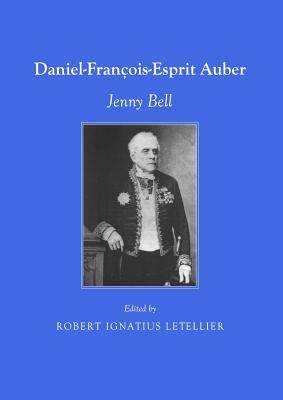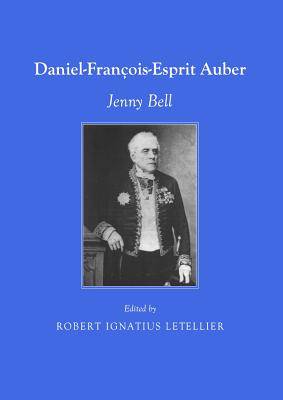
- Retrait gratuit dans votre magasin Club
- 7.000.000 titres dans notre catalogue
- Payer en toute sécurité
- Toujours un magasin près de chez vous
- Retrait gratuit dans votre magasin Club
- 7.000.0000 titres dans notre catalogue
- Payer en toute sécurité
- Toujours un magasin près de chez vous
Daniel-Francois-Esprit Auber
Jenny Bell
Livre broché | Anglais
115,45 €
+ 230 points
Description
Daniel-Francois-Esprit Auber (1782-1871), once one of the most well-known and well-loved names in French 19th-century opera, came later in life than many famous composers to his art, yet had one of the longest and most successful careers. He studied with Cherubini after abandoning an initial attempt to establish a career in commerce, and experienced his first real triumph at the age of 38 with La Bergere Chateleine (1820). His subsequent association with the librettist Eugene Scribe (1791-1861), a collaboration that lasted until Scribe's death, became one of the most famous and successful partnerships in musical history. Works such as Le Macon (1825) and La Muette de Portici (1828) cemented Auber's popularity with the public and drew official recognition and honours. In 1829 he was appointed a member of the Institut, in 1839 Director of Concerts at Court, in 1842 Director of the Conservatoire, in 1852 Musical Director of the Imperial Chapel, and in 1861 Grand Officer of the Legion d'Honneur. Auber's grand opera La Muette de Portici (also known by its hero's name as Masaniello), a work of great significance in the history of opera, is set against a background of revolution and uprising-a situation that Auber knew only too well. He lived through four French Revolutions (1789, 1830, 1848, 1870), dying at the advanced age of 89 in the desperate conditions of the Commune, of a long-standing illness aggravated by the dangers and privations that attended the Siege of Paris. Auber had always loved his home city, and was not prepared to leave it, even after his house had been set on fire by the petroleurs et petroleuses. Ironically, a mark had been placed against the house of the composer of La Muette de Portici, a man so successful in depicting revolutionary fervour that a performance of this opera in Brussels in 1830 had helped to inspire the revolution that led to the separation of Belgium from Holland. Auber's charming and graceful overtures were once staples of the light Classical repertoire, known and loved everywhere. His gracious melodies and dance rhythms had an overwhelming influence on piano and instrumental music, and on the genre of Romantic comic opera, especially in Germany. His operas, apart from Fra Diavolo (1830), have virtually passed out of the repertoire. Contemporary audiences are not attuned to Auber's elegant and restrained art, accustomed as they are to verismo, Wagnerian transcendentalism, and 20th-century experimentalism, but those willing to listen are rewarded by works that retain all their freshness, delicacy and charm. Jenny Bell, an opera-comique in three acts with libretto by Eugene Scribe, was premiered at the Opera-Comique (Deuxieme Salle Favart) on 2 June 1855. It is set in 18th-century London. Lord Mortimer, the son of the Duke of Greenwich, is in love with the celebrated diva, Jenny Bell, but his father has forbidden him to see her. Jenny then attempts to cure Mortimer's infatuation by reading to her guests all the love letters she has received, and finally accepts diamonds and a proposal from the goldsmith Dodson. Mortimer challenges him, curses Jenny, and leaves. Act 3 opens in the Guildhall, where Jenny is to sing for the Lord Mayor. She is highly despondent and refuses either to sing or to receive Dodson. The Duke sees that Jenny really loves his son, and contritely gives his consent for their marriage. This is another of Scribe and Auber's 'artistic' operas, reflecting on the professional challenges and social pressures that talented performers are called on to face as they seek to further their careers and stay faithful to their own ideals of integrity. It is a close relation of L'Ambassadrice (1836). The model for Jenny Bell was the famous Swedish soprano Jenny Lind, although she never sang the role. The piece is well constructed, with interesting situations and deftly-handled dialogue. The secondary characters of Henriette (Jenny's chamber maid), George Leslie, and Dodson are imaginatively integrated into the principal action. Motifs of an English provenance are introduced by the composer: the lovely tenor romance A sa voix, a sa vue features the theme of God save the king, and Jenny's variations on Rule Britannia close the opera brilliantly. This score is one of the richest among the composer's operas-comiques. It is a work that should be revived and better understood. The original cast were: Caroline Duprez (Jenny Bell); Edmund-Jules Ricquier-Delaunay (Mortimer); Jean-Baptist Faure (the Duke of Greenwich); Charles-Louis Sainte-Foy (Dodson); Joseph-Antoine-Charles Couderc (George Leslie); and Sophie Boulart (Henriette). The opera was in the repertoire for only one year, 1855, with a total of 36 performances.
Spécifications
Parties prenantes
- Editeur:
Contenu
- Nombre de pages :
- 280
- Langue:
- Anglais
Caractéristiques
- EAN:
- 9781443828918
- Date de parution :
- 01-05-11
- Format:
- Livre broché
- Format numérique:
- Trade paperback (VS)
- Poids :
- 4108 g

Les avis
Nous publions uniquement les avis qui respectent les conditions requises. Consultez nos conditions pour les avis.





